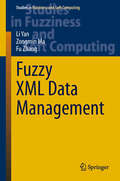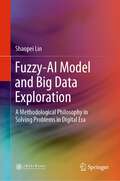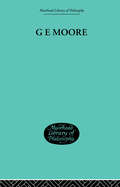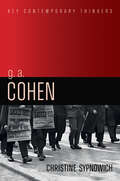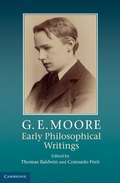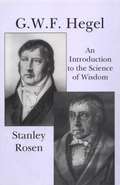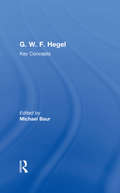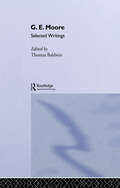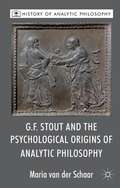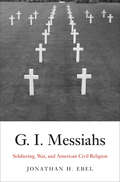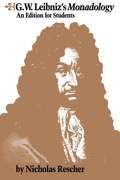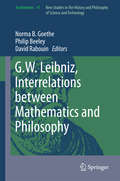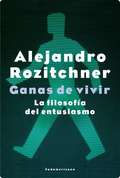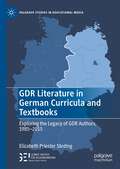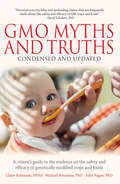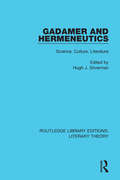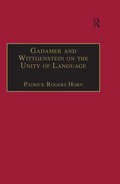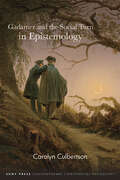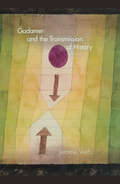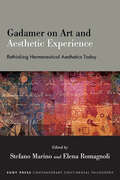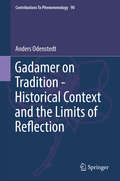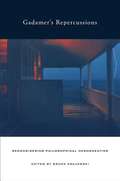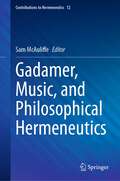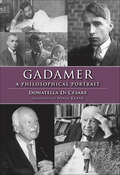- Table View
- List View
Fuzzy XML Data Management
by Li Yan Zongmin Ma Fu ZhangThis book presents an exhaustive and timely review of key research work on fuzzy XML data management, and provides readers with a comprehensive resource on the state-of-the art tools and theories in this fast growing area. Topics covered in the book include: representation of fuzzy XML, query of fuzzy XML, fuzzy database models, extraction of fuzzy XML from fuzzy database models, reengineering of fuzzy XML into fuzzy database models, and reasoning of fuzzy XML. The book is intended as a reference guide for researchers, practitioners and graduate students working and/or studying in the field of Web Intelligence, as well as for data and knowledge engineering professionals seeking new approaches to replace traditional methods, which may be unnecessarily complex or even unproductive.
Fuzzy-AI Model and Big Data Exploration: A Methodological Philosophy in Solving Problems in Digital Era
by Shaopei LinBased on the idea of a universal rule for problem solving, the book suggests that the “System-Fuzzy Approach (SFA)” Model can be applied to various complex real-world problems. It is the first book for problem solving in complicated problems with a universal project management tool. Systematic searching is an essential step in identifying the right direction in problem solving; and the fuzzy steps in concrete problem solving reflect the flexibility and compromises involved in the process. Nevertheless, the fuzzy steps also demonstrate human beings’ impressively flexible problem-solving skills. Simulating human decision-making processes based on fuzzy information processing is essential in our digital era, in which many problems need to be solved by means of artificial intelligence; hence the Fuzzy-AI Model emerged. As a universal rule and tool, it can be applied to a broad range of real-world problems. Offering a valuable guide to fuzzy decision-making, this book is intended for researchers, scientists and graduate students in the fields of Engineering, Economics, Sociology, Managerial Science, Project Management etc.
G E Moore: Essays in Retrospect
by Morris LazerowitzThis is Volume III of twenty-two volumes on 20th Century Philosophy. Originally published in 1970, this is a collection of essays of George Edward Moore (1873-1958) who was one of the most influential philosophers of the twentieth century, and the outcome of the changes he introduced into our ways of thinking in philosophy cannot yet be foreseen.
G. A. Cohen: Liberty, Justice and Equality (Key Contemporary Thinkers)
by Christine SypnowichG. A. Cohen was one of the towering political philosophers of the late twentieth and early twenty-first centuries. His intellectual career was unusually wide-ranging, and he was celebrated internationally not only for his for his penetrating ideas about liberty, justice, and equality, but for his method, a highly original and influential combination of analytical philosophy and Marxism. Christine Sypnowich guides readers through the rich body of Cohen’s work. By identifying five ‘paradoxes’ in his thought, she explores the origins of his interest in analytical philosophy, his engagement with the ideas of right-wing libertarianism, his critique of John Rawls’s work, his late-career turn to conservatism, and the tension between his preoccupation with individual responsibility and the idea of a socialist ethos. Sypnowich acknowledges the strengths of Cohen’s positions as well as their tensions and flaws, and presents him as a thinker of startling insight. This compelling introduction is a go-to resource for students and scholars of modern political philosophy.
G. E. Moore: Early Philosophical Writings
by Consuelo Preti Thomas BaldwinG. E. Moore's fame as a philosopher rests on his ethics of love and beauty, which inspired Bloomsbury, and on his 'common sense' certainties which challenge abstract philosophical theory. Behind this lies his critical engagement with Kant's idealist philosophy, which is published here for the first time. These early writings, Moore's fellowship dissertations of 1897 and 1898, show how he initiated his influential break with idealism. In 1897 his main target was Kant's ethics, but by 1898 it was the whole Kantian project of transcendental philosophy that he rejected, and the theory which he developed to replace it gave rise to the new project of philosophy as logical analysis. This edition includes comments by Moore's examiners Henry Sidgwick, Edward Caird and Bernard Bosanquet, and in a substantial introduction the editors explore the crucial importance of the dissertations to the history of twentieth-century philosophical thought.
G. W. F. Hegel: An Introduction To The Science Of Wisdom
by Stanley RosenG.W.F. Hegel: An Introduction to the Science of Wisdom
G. W. F. Hegel: Key Concepts (Key Concepts)
by Michael BaurThe thought of G. W. F. Hegel (1770 -1831) has had a deep and lasting influence on a wide range of philosophical, political, religious, aesthetic, cultural and scientific movements. But, despite the far-reaching importance of Hegel's thought, there is often a great deal of confusion about what he actually said or believed.G. W. F. Hegel: Key Concepts provides an accessible introduction to both Hegel's thought and Hegel-inspired philosophy in general, demonstrating how his concepts were understood, adopted and critically transformed by later thinkers. The first section of the book covers the principal philosophical themes in Hegel's system: epistemology, metaphysics, philosophy of mind, ethical theory, political philosophy, philosophy of nature, philosophy of art, philosophy of religion, philosophy of history and theory of the history of philosophy. The second section covers the main post-Hegelian movements in philosophy: Marxism, existentialism, pragmatism, analytic philosophy, hermeneutics and French poststructuralism.The breadth and depth of G. W. F. Hegel: Key Concepts makes it an invaluable introduction for philosophical beginners and a useful reference source for more advanced scholars and researchers.
G.E. Moore: Selected Writings (International Library of Philosophy)
by Thomas Baldwin G. E. MooreG.E. Moore, more than either Bertrand Russell or Ludwig Wittgenstein, was chiefly responsible for the rise of the analytic method in twentieth-century philosophy. This selection of his writings shows Moore at his very best.The classic essays are crucial to major philosophical debates that still resonate today. Amongst those included are:* A Defense of Common Sense* Certainty* Sense-Data* External and Internal Relations* Hume's Theory Explained* Is Existence a Predicate?* Proof of an External WorldIn addition, this collection also contains the key early papers in which Moore signals his break with idealism, and three important previously unpublished papers from his later work which illustrate his relationship with Wittgenstein.
G.F. Stout and the Psychological Origins of Analytic Philosophy
by Maria van der SchaarAn investigatation of the influence of psychology and early phenomenology on the origins of analytic philosophy. This book is also of value for those interested in judgement, proposition, psychologism, logical realism, the problem of error, Gestalt theories, and tropes.
G.I. Messiahs
by Jonathan H. EbelJonathan Ebel has long been interested in how religion helps individuals and communities render meaningful the traumatic experiences of violence and war. In this new work, he examines cases from the Great War to the present day and argues that our notions of what it means to be an American soldier are not just strongly religious, but strongly Christian. Drawing on a vast array of sources, he further reveals the effects of soldier veneration on the men and women so often cast as heroes. Imagined as the embodiments of American ideals, described as redeemers of the nation, adored as the ones willing to suffer and die that we, the nation, may live-soldiers have often lived in subtle but significant tension with civil religious expectations of them. With chapters on prominent soldiers past and present, Ebel recovers and re-narrates the stories of the common American men and women that live and die at both the center and edges of public consciousness. "
G.W. Leibniz's Monadology
by Nicholas RescherFirst published in 1992. Routledge is an imprint of Taylor & Francis, an informa company.
G.W. Leibniz, Interrelations between Mathematics and Philosophy
by Norma B. Goethe Philip Beeley David RabouinUp to now there have been scarcely any publications on Leibniz dedicated to investigating the interrelations between philosophy and mathematics in his thought. In part this is due to the previously restricted textual basis of editions such as those produced by Gerhardt. Through recent volumes of the scientific letters and mathematical papers series of the Academy Edition scholars have obtained a much richer textual basis on which to conduct their studies - material which allows readers to see interconnections between his philosophical and mathematical ideas which have not previously been manifested. The present book draws extensively from this recently published material. The contributors are among the best in their fields. Their commissioned papers cover thematically salient aspects of the various ways in which philosophy and mathematics informed each other in Leibniz's thought.
GANAS DE VIVIR (EBOOK)
by Alejandro RozitchnerAlejandro Rozitchner es un intelectual de nuestro tiempo, conocido por su estilo provocador y por su concepción afirmativa de la realidad. Como pensador desarrolló una visión del mundo en la que se conjugan la filosofía existencialista, la psicoterapia y una gran influencia de Nietzsche. Ganas de vivir propone una posición vital positiva e inteligente, es una guía que influenciará con seguridad a sus lectores dándoles fuerza y ayudándolos a desplegar su mundo personal. Un texto cargado de perspectivas para fortalecer el desarrollo propio y ajeno, un libro amistoso que busca meterse en la vida concreta para producir orientación y favorecer el autoconocimiento.
GDR Literature in German Curricula and Textbooks: Exploring the Legacy of GDR Authors, 1985-2015 (Palgrave Studies in Educational Media)
by Elizabeth Priester StedingThis book analyzes the changing portrayal of GDR literature in German Gymnasium textbooks 1985-2015. Addressing the need for textbook research to broaden its focus from GDR history to GDR literature, the author presents case studies of well-known GDR authors (Bertolt Brecht, Johannes R. Becher, Anna Seghers, Wolf Biermann, and Christa Wolf), each examining a particular aspect of the societal discourse about GDR literature and the tension between (literary) text and (historical) context. Taken together, the case studies reveal the frequently underestimated power of ideology in literature textbooks. They also show how attempts to package these authors into simplified categories ultimately reveal the profound complexities of the GDR literary legacy. By examining the clear tension between literature and politics in textbooks and curricula, the author demonstrates how ideological messages are transmitted in all textbooks, as well as the importance of attending to overt and covert ideology.
GMO Myths and Truths: A Citizen’s Guide to the Evidence on the Safety and Efficacy of Genetically Modified Crops and Foods, 3rd Edition
by Claire Robinson John Fagan Michael AntoniouIt is often claimed that the case against genetically modified (GM) crops and foods is based on emotion, not science, and that to oppose GM crop and food technology is to be anti-science. It is also claimed that GM crops offer higher yields and better nutrition, that they are safe for health and the environment, that they reduce agrochemical use, and that they are needed to feed the world's growing population. This book, co-authored by two genetic engineers and a writer/researcher, exposes these claims as false, using scientific and other documented evidence. GMO Myths and Truths summarizes the facts on the safety and efficacy of genetically modified (GM) crops and foods in terms that are accessible to the non-scientist but still relevant to scientists, policymakers and educators. The evidence presented points to many hazards, risks, and limitations of genetic engineering technology. These include harms found in animal feeding and ecological studies, which in turn indicate risks to health and the environment posed by GM crops and foods. The layout of the book enables those readers with limited time to read the chapter summaries, while providing more detail and full references for those who require them. At 164 pages of paperback size, this new condensed version is shorter and more accessible than the authors' 330-page report by the same name, which has been downloaded over half a million times. The book shows that conventional breeding continues to outstrip GM in developing crops that deliver high yields, better nutrition, and tolerance to extreme weather conditions and poor soils. In agreement with over 400 international experts who co-authored a UN and World Bank-sponsored report on the future of farming, the authors conclude that modern agroecology, rather than GM, is the best path for feeding the world's current and future populations in a safe and sustainable way.
Gadamer and Hermeneutics: Science, Culture, Literature (Routledge Library Editions: Literary Theory #12)
by Hugh J. SilvermanThis title, first published in 1991, opens with an account by Gadamer of his own life and work and their relation to the achievements of hermeneutics. Building upon the key theme of dialogue, Gadamer and Hermeneutics provides a series of essays, either linked Gadamer to other major contemporary philosophers or focusing on a given Gadamerian theme. This book will be of interest to students of literary theory.
Gadamer and Wittgenstein on the Unity of Language: Reality and Discourse without Metaphysics (Ashgate Wittgensteinian Studies)
by Patrick Rogers HornIn this innovative comparison of Gadamer and Wittgenstein, the author explores their common concern with the relation of language to reality. Patrick Horn's starting point is the widely accepted view that both philosophers rejected a certain metaphysical account of that relation in which reality determines the nature of language. Horn proceeds to argue that Gadamer never completely escaped metaphysical assumptions in his search for the unity of language. In this respect, argues Horn, Gadamer's work is nearer to the earlier rather than to the later Wittgenstein. The final chapter of the book highlights the work of Wittgenstein’s pupil Rush Rhees, who shows that Wittgenstein's own later emphasis on language games, while doing justice to the variety of language, does less than justice to the dialogical relation between speakers of a language, wherein the unity of language resides. Contrasting Rhees's account of the unity of language with those given by Gadamer and the early Wittgenstein brings out the importance of understanding reality in terms of the life that people share rather than in terms of what philosophers say about reality.
Gadamer and the Legacy of German Idealism
by Kristin GjesdalThe philosophy of Hans-Georg Gadamer interests a wide audience that spans the traditional distinction between European (continental) and Anglo-American (analytic) philosophy. Yet one of the most important and complex aspects of his work - his engagement with German Idealism - has received comparatively little attention. In this book, Kristin Gjesdal uses a close analysis and critical investigation of Gadamer's Truth and Method (1960) to show that his engagement with Kant, Hegel, and Schleiermacher is integral to his conception of hermeneutics. She argues that a failure to engage with this aspect of Gadamer's philosophy leads to a misunderstanding of the most pressing problem of post-Heideggerian hermeneutics: the tension between the commitment to the self-criticism of reason, on the one hand, and the turn towards the meaning-constituting authority of tradition, on the other. Her study provides an illuminating assessment of both the merits and the limitations of Gadamer's thought.
Gadamer and the Social Turn in Epistemology (SUNY series in Contemporary Continental Philosophy)
by Carolyn CulbertsonWhile some take Gadamer's Truth and Method to be a departure from epistemological questions and concerns, author Carolyn Culbertson reads Gadamer's work as offering a valuable reflection on the nature of understanding—one that is deeply resonant with the recent social turn in epistemology. Like social epistemologists, Gadamer worries about the epistemic irresponsibility that we encourage when we treat an attitude of objectivity, wherein the inquirer lacks any awareness of their social and historical situation, as an epistemic ideal. Like social epistemologists too, Gadamer argues that understanding that one is socially and historically situated does not mean believing that one is fated to simply repeat traditional ideas without critique or modification—a concern frequently raised in response to critiques of Enlightenment epistemology. By developing such parallels, Gadamer and the Social Turn in Epistemology offers seasoned readers of Gadamer a new context in which to appreciate his discussion of understanding in Truth and Method and readers unfamiliar with Gadamer a productive point of access into his major work.
Gadamer and the Transmission of History (Studies In Continental Thought Ser.)
by Jerome VeithObserving that humans often deal with the past in problematic ways, Jerome Veith looks to philosopher Hans-Georg Gadamer and his hermeneutics to clarify these conceptions of history and to present ways to come to terms with them. Veith fully engages Truth and Method as well as Gadamer's entire work and relationships with other German philosophers, especially Kant, Hegel, and Heidegger in this endeavor. Veith considers questions about language, ethics, cosmopolitanism, patriotism, self-identity, and the status of the humanities in the academy in this very readable application of Gadamer's philosophical practice.
Gadamer on Art and Aesthetic Experience: Rethinking Hermeneutical Aesthetics Today (SUNY series in Contemporary Continental Philosophy)
by Stefano Marino; Elena RomagnoliHans-Georg Gadamer was one of the greatest intellectual figures of the twentieth century. As a philosopher trained in phenomenology, he established philosophical hermeneutics as one of the leading traditions of contemporary philosophy and opened new paths for philosophical reflection. Within the many dimensions of Gadamer's vast, complex, and multifaceted thinking, a special role is played by the question concerning the relevance of the various arts and the centrality of aesthetic experience in human life. Despite being one of the most relevant voices of twentieth-century philosophy, Gadamer's hermeneutics has at times been overlooked in contemporary philosophical debates. The firm conviction at the basis of this volume is that Gadamer's thought is still relevant today, especially regarding aesthetic questions concerning the persistent meaning and truth of art in the age of what he called "the shadow of nihilism" and in the age of the so-called "end of art." In contrast to the claim that Gadamer's philosophy is "anti-modern," or allegedly "out of date" in comparison to other philosophical approaches to aesthetic questions, Gadamer on Art and Aesthetic Experience aims to show that a renewed and critical confrontation with Gadamer's aesthetic thinking can offer stimulating and penetrating insights to understand the role of art in contemporary society in all its transformations and its challenging manifestations.
Gadamer on Tradition - Historical Context and the Limits of Reflection
by Anders OdenstedtThis book discusses Gadamer's theory of context-dependence. Analytical and partly critical, the book also shows exegetical accuracy in the rendering of Gadamer's position. It explores the following questions that Gadamer's theory of context-dependence tries to answer: in what way is thought influenced by and thus dependent on its historical context? To what extent and in what way is the individual able to become reflectively aware of and emancipate himself from this dependence? The book takes Gadamer's wide interests into account, e. g. issues relating to the history of historiography and the nature of art and aesthetic experience. The problem of the context-dependence of thought is prominent in contemporary philosophy, including the fields of structuralism, post structuralism, deconstruction, certain forms of feminist philosophy and the philosophy of science. In this sense, the book discusses an issue with wide repercussions.
Gadamer's Repercussions: Reconsidering Philosophical Hermeneutics
by Bruce KrajewskiThis volume brings together many prominent scholars to assess, re-evaluate, and question Hans-Georg Gadamer's works, as well as his place in intellectual history. The book includes a recent essay by Gadamer on "the task of hermeneutics."
Gadamer, Music, and Philosophical Hermeneutics (Contributions to Hermeneutics #12)
by Sam McAuliffeThis volume explores Hans-Georg Gadamer's philosophical hermeneutics within a musical context. It features contributions from philosophers, musicians, educators, and musicologists from a variety of backgrounds, and sheds light on both the hermeneutic nature of music and the musicality of hermeneutics. Contributors to this volume hermeneutically think with music to uncover its fundamentally hermeneutic character, and by thinking with Gadamer in a musical context, explore ways in which hermeneutics may be understood to possess an inherent musicality. Gadamer's thought is taken up in a variety of musical contexts including improvisation, musical performance, classical music, jazz, and music criticism.This first volume to explore Gadamer's hermeneutics in a musical context breaks new ground by challenging musical concepts and by pushing Gadamer's thought in new directions. It appeals to philosophers engaged with Gadamer's thought (and philosophical hermeneutics more broadly), as well as philosophers of music, musicologists, and musicians interested in critically engaging with the practice of performing and listening to music.
Gadamer: A Philosophical Portrait (Studies in Continental Thought)
by Donatella Di CesareHans-Georg Gadamer (1900-2002), one of the towering figures of contemporary Continental philosophy, is best known for Truth and Method, where he elaborated the concept of "philosophical hermeneutics," a programmatic way to get to what we do when we engage in interpretation. Donatella Di Cesare highlights the central place of Greek philosophy, particularly Plato, in Gadamer's work, brings out differences between his thought and that of Heidegger, and connects him with discussions and debates in pragmatism. This is a sensitive and thoroughly readable philosophical portrait of one of the 20th century's most powerful thinkers.
